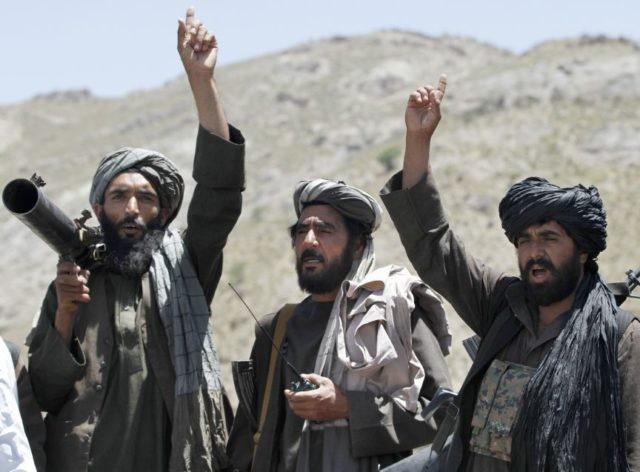The Taliban’s alleged benefactor, Moscow, is reportedly obstructing the Trump administration’s efforts to end the nearly 17-year war by intensifying support for the jihadist group as a means to pressure the United States into lifting sanctions on Russia.
CBS News reported:
As the Trump administration continues advocating for a peace process in Afghanistan, U.S. officials are accusing the Russian government of hindering their efforts. Moscow has increased its support for the Taliban over the last year and a half amid decaying U.S.-Russia relations, according to administration officials.
Citing unnamed officials from both sides of the pond, CBS added, “Moscow is holding peace in Afghanistan hostage as their bilateral relations with the U.S. grow more toxic.”
It appears Russia is holding Taliban peace talks as a bargaining chip to convince the United States to lift some of the sanctions that have crippled the Russian economy.
“Russian support for the Taliban, which has been at war with U.S.-led coalition forces since 2001, includes the sharing of sensitive intelligence data,” CBS revealed.
Some analysts, including experts from the Rand Corporation, believe Russian aid to the Taliban is granting the jihadist group the option to delay or move ahead with any peace negotiations and ultimately gain more influence under a potential power-sharing arrangement with Kabul.
U.S. Secretary of Defense Jim Mattis stressed that at least some members of the Taliban are interested in peace negotiations, although the group has not responded positively as a whole to the offer.
This month, U.S. Afghan President Ashraf Ghani offered a ceasefire and an official political recognition of the Taliban as an offer to bring the nearly 17-year conflict to a close.
Asked if talks with the Taliban were premature, Secretary Mattis recently declared:
You don’t want to miss an opportunity because you weren’t alert to the opportunity. So you need to have that door open even if you increase the military pressure. We know there is interest on the Taliban side. We know that. So when you put all these together then that’s why I think we are on the right track.
Referring to U.S and Russia working together on reaching peace, an unnamed U.S. Department of State (DOS) official explicitly said, “It’s not an area of cooperation for them yet.”
Bringing the Taliban to the negotiating table in Afghanistan is a significant tenet of Trump’s strategy to end the conflict.
The U.S. military has repeatedly warned against “external actors,” such as Russia, Iran, and Pakistan’s fueling instability and rendering Taliban jihadists stronger as they fight against the United States and its allies.
Taliban terrorists, Russia, Iran, and Pakistan all want the United States to leave the region.
Russia is reportedly using Taliban peace negotiations as a bargaining chip to coerce the U.S. to lift sanctions.
“It’s now up to the Taliban leaders to respond to this serious offer. This is a peace offer that the United States supports and is prepared to facilitate, but we cannot substitute for the direct negotiations that are required between the Afghan government and the Taliban leadership,” Alice Wells from DOS declared this month, referring to Ghani’s olive branch offered to the Taliban.
Echoing the U.S. military, CBS reported:
The State Department argues that Russia’s support for the Taliban perpetuates instability across the region. Russia, meanwhile, insists that they are only trying to help destroy ISIS – a Taliban rival — in the country and that the U.S. is supporting ISIS. Russian support for the Taliban has led to public disagreements among American and Russian government officials and continued to enrage the U.S.
Under Trump, the U.S. military has intensified efforts against militants in the Afghanistan-Pakistan region, home to the largest concentration of terrorists in the world.

COMMENTS
Please let us know if you're having issues with commenting.